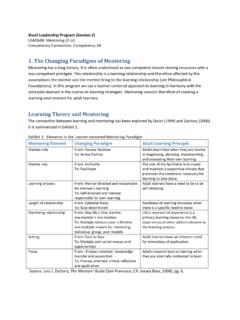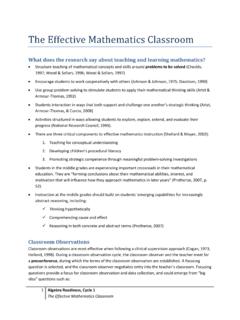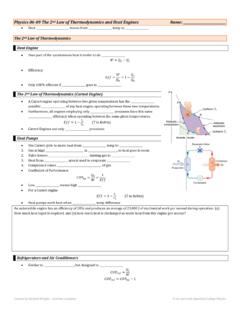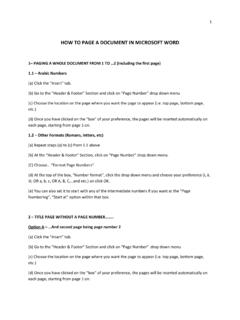Transcription of Self-Care Assessment Worksheet - Andrews University
1 Self-Care Assessment Worksheet This Assessment tool provides an overview of effective strategies to maintain Self-Care . After completing the full Assessment , choose one item from each area that you will actively work to improve. Using the scale below, rate the following areas in terms of frequency: 5 = Frequently 4 = Occasionally 3 = Rarely 2 = Never 1 = It never occurred to me Physical Self-Care ___ Eat regularly ( breakfast, lunch and dinner) ___ Eat healthy ___ Exercise ___ Get regular medical care for prevention ___ Get medical care when needed ___ Take time off when needed ___ Get massages ___ Dance, swim, walk, run, play sports, sing, or do some other physical activity that is fun ___ Take time to be sexual with yourself, with a partner ___ Get enough sleep ___ Wear clothes you like ___ Take vacations ___ Take day trips or mini-vacations ___ Make time away from telephones ___ Other.
2 Psychological Self-Care ___ Make time for self-reflection ___ Have your own personal psychotherapy ___ Write in a journal ___ Read literature that is unrelated to work ___ Do something at which you are not expert or in charge ___ Decrease stress in your life Source: Transforming the Pain: A Workbook on Vicarious Traumatization. Saakvitne, Pearlman & Staff of TSI/CAAP (Norton, 1996) ___ Let others know different aspects of you ___ Notice your inner experience listen to your thoughts, judgments, beliefs, attitudes, and feelings ___ Engage your intelligence in a new area, go to an art museum, history exhibit, sports event, auction, theater performance ___ Practice receiving from others ___ Be curious ___ Say no to extra responsibilities sometimes ___ Other.
3 Emotional Self-Care ___ Spend time with others whose company you enjoy ___ Stay in contact with important people in your life ___ Give yourself affirmations, praise yourself ___ Love yourself ___ Re-read favorite books, re-view favorite movies ___ Identify comforting activities, objects, people, relationships, places and seek them out ___ Allow yourself to cry ___ Find things that make you laugh ___ Express your outrage in social action, letters and donations, marches, protests ___ Play with children ___ Other: Spiritual Self-Care ___ Make time for reflection ___ Spend time with nature ___ Find a spiritual connection or community ___ Be open to inspiration ___ Cherish your optimism and hope ___ Be aware of nonmaterial aspects of life ___ Try at times not to be in charge or the expert ___ Be open to not knowing Source: Transforming the Pain: A Workbook on Vicarious Traumatization.
4 Saakvitne, Pearlman & Staff of TSI/CAAP (Norton, 1996) ___ Identify what in meaningful to you and notice its place in your life ___ Meditate ___ Pray ___ Sing ___ Spend time with children ___ Have experiences of awe ___ Contribute to causes in which you believe ___ Read inspirational literature (talks, music, etc.) ___ Other: Workplace or Professional Self-Care ___ Take a break during the workday ( lunch) ___ Take time to chat with co-workers ___ Make quiet time to complete tasks ___ Identify projects or tasks that are exciting and rewarding ___ Set limits with your clients and colleagues ___ Balance your caseload so that no one day or part of a day is too much ___ Arrange your work space so it is comfortable and comforting ___ Get regular supervision or consultation ___ Negotiate for your needs (benefits, pay raise)
5 ___ Have a peer support group ___ Develop a non-trauma area of professional interest ___ Other: Balance ___ Strive for balance within your work-life and workday ___ Strive for balance among work, family, relationships, play and rest Source: Transforming the Pain: A Workbook on Vicarious Traumatization. Saakvitne, Pearlman & Staff of TSI/CAAP (Norton, 1996) REPLENISH THE WELL: AN EXPERIENCE IN Self-Care Self-Care Worksheet Neglecting Self-Care can have negative effects on body, mind, and spirit, leaving us depleted and out of balance.
6 For this reason, it is important to have Self-Care strategies that address each of these parts of ourselves. Organizations also need to support Self-Care for staff and volunteers. On the chart below, list as many Self-Care strategies as you can. (An example is given in each area to get you started). After you have listed strategies, place a check-mark (T) to any that you do regularly, and put a star (n) next to any you might like to consider adding to add to your life. PHYSICAL MENTAL (INCLUDES EMOTIONAL) SPIRITUAL ORGANIZATIONAL Aerobic exercise Sharing upset feelings with a friendMeditation Regularly scheduled peer supervision group Exercise developed by Catherine D.
7 Nugent, for Replenish the Well: An Experience in Self-Care , workshop presented at Peer Services: A Life in the Community for Everyone, Fifth Annual Conference of the Substance Abuse and Mental Health Services Administration, Center for Substance Abuse Treatment s Recovery Community Services Program, Washington, DC, July 13, 2004.











